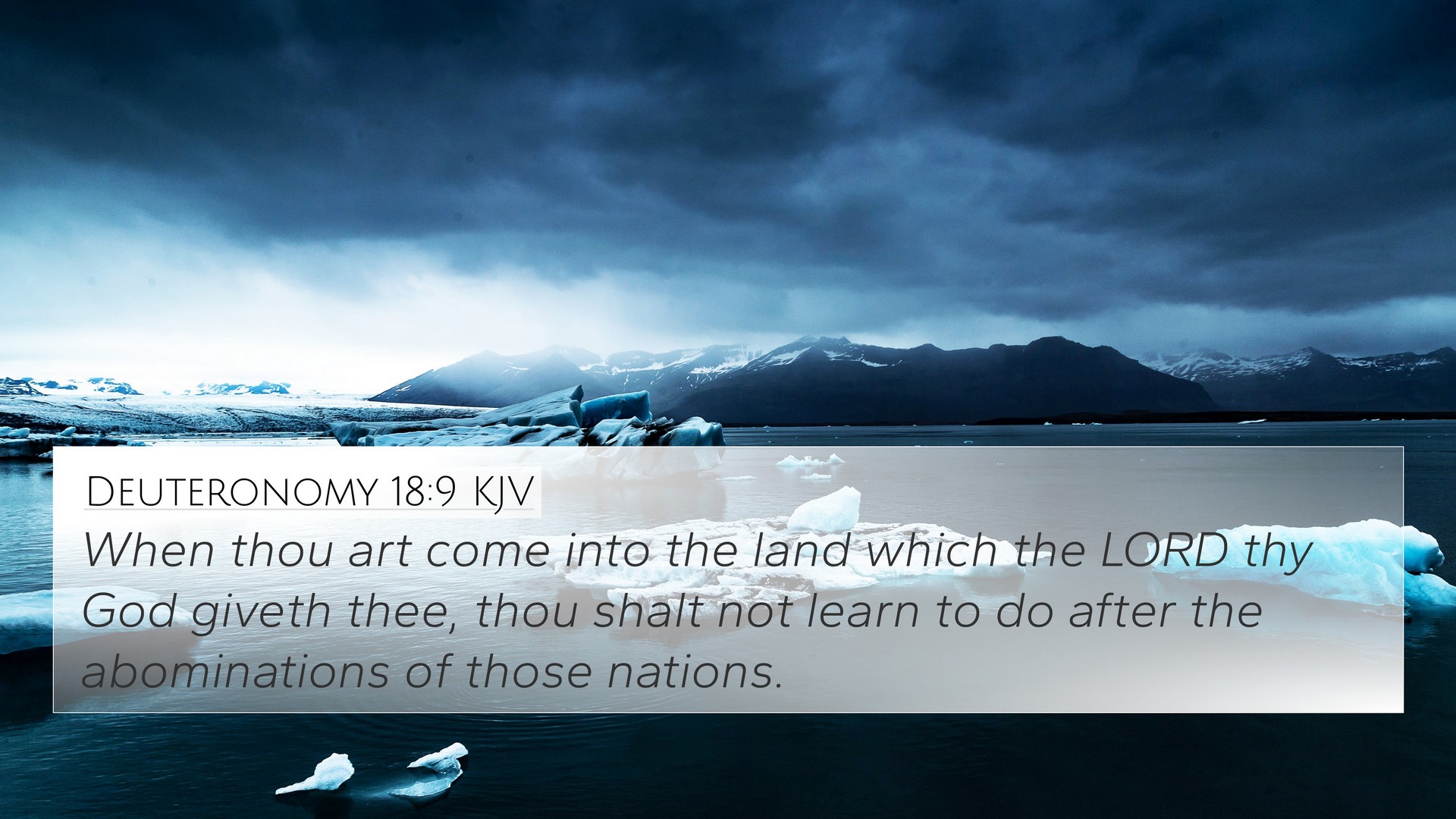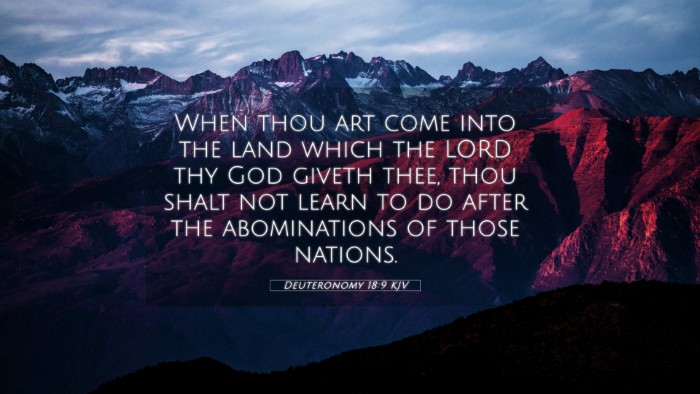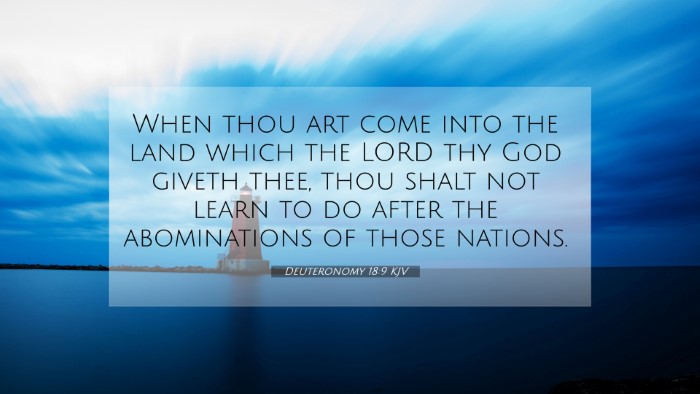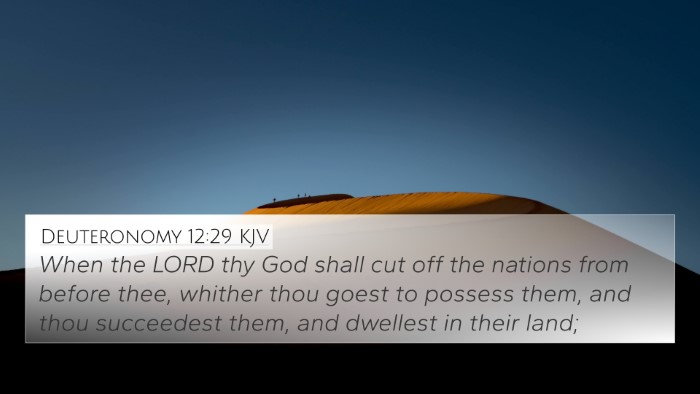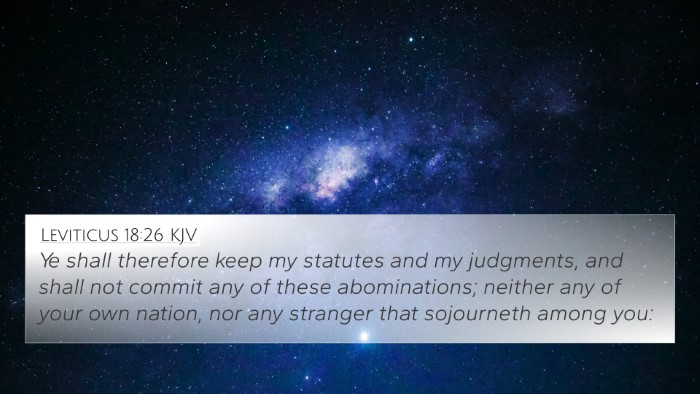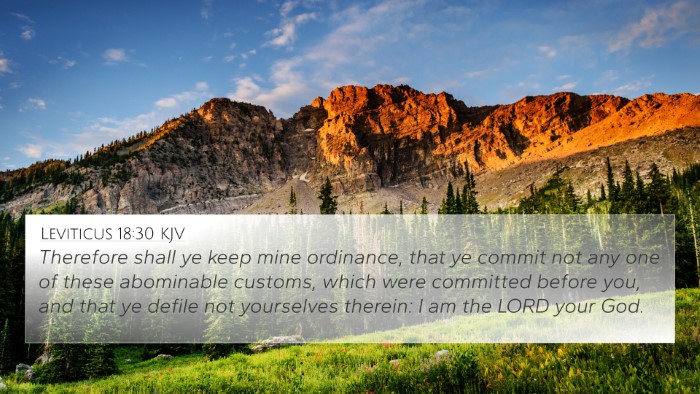Understanding Deuteronomy 18:9
Bible Verse: "When you enter the land the LORD your God is giving you, do not learn to imitate the detestable ways of the nations there."
Summary of Insights
In Deuteronomy 18:9, the Lord instructs His people about the dangers of adopting the practices and customs of the nations surrounding them. This command serves as a foundational principle for maintaining holiness and fidelity to God's statutes. The following commentaries provide a deeper understanding of this verse:
-
Matthew Henry's Commentary:
Henry emphasizes that the Israelites were entering a land filled with idolatrous practices and wicked customs. He highlights the importance of separating from those practices to avoid corrupting their covenant relationship with God. The verse serves as a warning against spiritual compromise.
-
Albert Barnes' Notes on the Bible:
Barnes elaborates on the concept of "detestable ways," noting that these practices often included child sacrifice and divination. He asserts that God desires His people to uphold His commandments distinctly, as their lives serve as a testament to His holiness among the nations.
-
Adam Clarke's Commentary:
Clarke explains that the Lord's warning is not just a call for physical separation but a deeper spiritual caution. He underscores that adopting foreign customs can lead to spiritual downfall, urging believers to remain steadfast in their faith and practices.
Key Themes and Connections
This verse prompts important connections and themes throughout the Bible:
-
Holiness of God:
Throughout scripture, God commands His people to be holy, paralleling with 1 Peter 1:16: "For it is written: 'Be holy, because I am holy.'
-
Influence of Surrounding Nations:
Examples of Israel's compromise are seen in Judges 2:11-13, where the Israelites adopted the practices of the Canaanites. This historical account shows the direct consequences of ignoring God's commands.
-
Divine Warnings Against Idolatry:
This theme reverberates through the text, especially in Exodus 34:12-14, where God warns against making covenants with the inhabitants of Canaan, reiterating the need for separation.
-
The Prophetic Call:
Prophets like Jeremiah echo this call for separation in Jeremiah 10:2, cautioning Israel against the practices of the nations.
-
Jesus' Teaching on Separation:
In the New Testament, the principle of being set apart continues in John 15:19, where Jesus explains that believers are not of the world, which reflects the same ethos of Deuteronomy 18:9.
-
Christian Conduct:
Paul reiterates this theme in 2 Corinthians 6:17, where he discusses the need for believers to come out from among them and be separate.
-
The Ultimate Authority of Scripture:
This call to obedience also connects with 2 Timothy 3:16-17, underscoring that all Scripture is God-breathed and instructive for righteousness.
Cross References for Deuteronomy 18:9
The following verses are connected to the themes present in Deuteronomy 18:9:
- Exodus 23:24 - "Do not bow down before their gods or worship them or follow their practices."
- Leviticus 20:23 - "You must not live according to the customs of the nations... because they did all these things, and I abhorred them."
- Isaiah 8:19 - "When men tell you to consult mediums and spiritists, who whisper and mutter, should not a people inquire of their God?"
- Acts 15:20 - "Instead we should write to them, telling them to abstain from food polluted by idols..."
- 1 Corinthians 10:21 - "You cannot drink the cup of the Lord and the cup of demons too..."
- Revelation 18:4 - "Come out of her, my people, so that you will not share in her sins..."
- Romans 12:2 - "Do not conform to the pattern of this world, but be transformed by the renewing of your mind."
Resources for Bible Cross-Referencing
For deeper study, believers may consider utilizing the following tools:
- Bible Concordance: A comprehensive tool to quickly find references and related verses.
- Cross-Reference Bible Study: Methods to draw connections between various scriptures.
- Bible Cross-Reference System: Systems that organize how verses relate to each other thematically.
- Bible Chain References: A technique where verses lead sequentially to other related scriptures.
- Cross-Referencing Bible Study Methods: Engaging with scripture through thematic or narrative references.
Conclusion
Deuteronomy 18:9 serves as a powerful directive for God's people, emphasizing the importance of maintaining spiritual distinctiveness in a world filled with contrary values. Through exploring its themes, we find rich interconnections that span across the Old and New Testaments, urging believers to seek holiness and truth. By engaging in tools for Bible cross-referencing, one can further enhance their understanding and develop a more profound insight into the nature of God's word.
